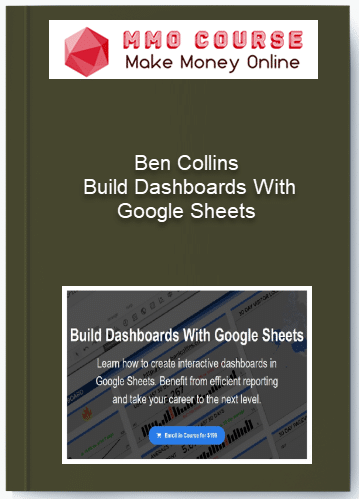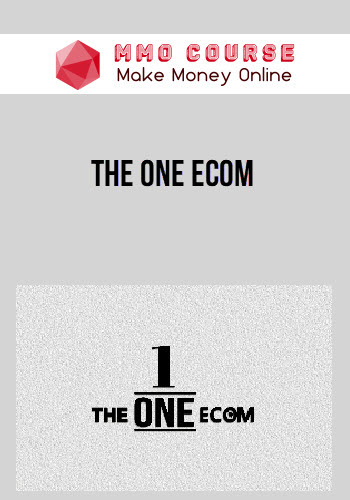Ben Collins – Build Dashboards With Google Sheets
$199.00 $23.96
GB Status : Instant Deliver
Sales Page: https://courses.benlcollins.com/p/dashboards
Description
Here’s What’s Included:
- Learn how to create interactive dashboards in Google Sheets. Benefit from efficient reporting and take your career to the next level.
- Do you spend hours collecting data, wrestling it into the format you need and then updating the same report that no one ever reads?
- Or maybe you’re neck deep in data but don’t know how to use it to make sound business and marketing decisions?
- Dashboards give you a high-level overview of your business, showing KPIs, trends and data comparisons… so you can use that insight to grow in smart ways.
- By learning some relatively simple techniques, you can create dashboards that are automated, interactive and visually appealing.
This course will set you up to:
Have the confidence to build your own dashboards with your own datasets
Know what to include in your dashboards to maximize their impact
Have the technical skills to manage advanced dashboard projects without feeling overwhelmed
Create interactive dashboards, so colleagues and clients can view the data they want to see
Understand and use best practices in Google Sheets, to avoid making the same mistakes I made
Be confident using advanced formulas and pivot tables
Use Apps Script to automate processes and make your dashboards work for you!
Each lesson is taught through bite-sized, action-oriented 5 – 10 minute-long videos, covering practical techniques you can apply to your own business.
I’ll be with you every step of the way, showing you the sheet setup, the formulas and the charts we use.
For each example you’ll have all the necessary raw data and formulas, as well as a final, finished template!
I’ll tell you more about the course in a moment…
…but first let me reassure you:
I’ve made just about every mistake in the book
Prior to consulting and creating courses, I worked as a forensic accountant, doing investigations into sanctions violations at large financial organizations.
I remember the first time I built a dashboard in Excel at work.
After a lot of headaches and frustration, I had created a presentable dashboard that gave our team oversight of whole dataset.
The dashboard wasn’t pretty, and it probably violated dashboard best principles, but it worked. It was dynamic and I clearly remember how cool that was.
However, I had no idea what I was doing. I barely even knew what dashboards were, and I certainly didn’t know there were courses and books out there that could have saved me hours and hours (and resulted in a
better end product!).
Seeing the team interact with the dashboard, I realized how valuable solid data and spreadsheet skills were — something we address throughout this course.
Fast forward to today
Today I create online courses and write about working with data, with a particular focus on how-to articles for learning data analytics and building dashboards, using Google Sheets, Apps Script and Data Studio.
Since mid-2015, I’ve been working as a freelance spreadsheet developer, data consultant and instructor.
I’ve taught data analysis and visualization courses and workshops at General Assembly’s Washington, D.C., campus and privately for clients.
What are dashboards?
Dashboards are high-level summaries of your organization’s data, displayed side-by-side in a single page to highlight the key metrics and trends at a glance. They’ll help you:
- Quickly understand the pulse of your business
- Visually summarize key metrics for stakeholders who don’t have time to review the data
- See new insights with your data side-by-side
- Explore the data with interactive features
- Speed up and automate your reporting pipeline
Here’s how you might use dashboards:
- Show growth of your website or clients’ websites, by tracking traffic and social media metrics over time.
- Understand your business better by collecting and analyzing user data in real-time.
- Compare sales data across different time periods, sales channels or geographic regions to get deeper insights into your opportunities.
- Measure student attendance and performance to easily see where to allocate resources.
- Track and visualize financial data to uncover high- and low-performing areas of your company, so you can make adjustments going forward.
Earlier this year I ran a couple of webinars, and here’s what some folks were saying about this Google Sheets dashboard training course:
Enroll now to get:
- Actionable, bite-size video lessons that walk you step-by-step through techniques
- Access to all the raw data files
- Copies of the finished dashboard templates, which you can copy as many times as you like
- Access to the private course Facebook group for Q&A
- Certificate upon completion
Who is this course for?
- Anyone who works with data in Google Sheets.
- Someone who is curious to learn more about Google Sheets and dashboards.
- Maybe you’re a data analyst, a technical marketer, an educator, a scientist or someone in between.
- Anyone who wants to add new a skill, building dashboards, that will help you advance your career.
What are the prerequisites?
- A Google account.
- Access to Google Sheets.
- Basic familiarity with Google Sheets and spreadsheets, although the first couple of dashboards are set up so that everyone should be able to follow along.
- Access to a Google Analytics account to get the most out of the Digital Marketing dashboard lectures.
Course Curriculum
Chapter 1: Course Introduction
- Lesson 1: Introduction (3:28)
- Lesson 2: About the Author (2:20)
- Lesson 3: How is this course structured? (1:22)
- Lesson 4: Why use Google Sheets to build your dashboards? (4:25)
- Lesson 5: What is a dashboard? (6:28)
- Google Sheets Chart Tool Update (3:13)
Join the course Facebook Group
Chapter 2: Static Sales Dashboard
- Lesson 6: Introduction to the Static Sales Dashboard (1:20)
- Lesson 7: The raw data (8:34)
- Lesson 8: Setting up the Summary Data Table (4:00)
- Lesson 9: Introduction to Pivot Tables (7:56)
- Lesson 10: Creating the Revenue Chart (2:19)
- Lesson 11: Using Pivot Tables to breakdown Sales by Channel (5:21)
- Lesson 12: Creating the Sales Channel Chart (2:04)
- Lesson 13: More pivot table practice! (4:27)
- Lesson 14: Creating a Geographic chart to show sales by US State (3:18)
- Lesson 15: Advanced features of pivot tables to find the Top 10 products (4:54)
- Lesson 16: Building our Sales Dashboard Part 1 (9:46)
- Lesson 17: Building our Sales Dashboard Part 2 (2:30)
- Lesson 18: Building our Sales Dashboard Part 3 (9:13)
- Lesson 19: Building our Sales Dashboard Part 4 (3:39)
- Lesson 20: Sharing your dashboard (9:21)
Chapter 3: Dynamic dashboards
- Lesson 21: Interactive dashboard introduction (1:38)
- Lesson 22: The raw data for the interactive dashboard (4:56)
- Lesson 23: Named ranges in Google Sheets (alternative method to lesson 23) (4:38)
- Lesson 24: Interactive dashboard data validation (4:57)
- Lesson 25: Interactive dashboard staging tables 1 (10:24)
- Lesson 26: Interactive dashboard staging tables 2 (10:59)
- Lesson 27: Dynamic charts (4:42)
- Lesson 28: Interactive dashboard build 1 (15:24)
- Lesson 29: Interactive dashboard build 2 (6:27)
Chapter 4: Dynamic Sales Dashboard
- Lesson 30: Dynamic sales dashboard introduction (1:17)
- Lesson 31: Interactive sales data validation (3:00)
- Lesson 32: Dynamic Key Performance Indicators (4:19)
- Lesson 33: Dynamic revenue table and chart (5:33)
- Lesson 34: Dynamic sales channel chart (3:22)
- Lesson 35: Dynamic sales geographic chart (4:58)
- Lesson 36: Dynamic Top 10 table (9:16)
- Lesson 37: Interactive sales dashboard final build (6:44)
Chapter 5: Real Estate dashboard using Google Forms
- Lesson 38: Real estate dashboard introduction (3:42)
- Lesson 39: Real estate dashboard raw data (2:20)
- Lesson 40: Using Google Forms to collect data (8:42)
- Lesson 41: Real estate sales funnel chart (7:42)
- Lesson 42: Agent Performance stacked bar chart (6:36)
- Lesson 43: Real estate financial charts (11:38)
- Lesson 44: Real estate detailed agent breakdown charts (10:13)
- Lesson 45: Real estate dashboard build 1 (11:59)
- Lesson 46: Real estate dashboard build 2 (6:08)
Chapter 6: Digital marketing dashboard
- Lesson 47: Digital marketing dashboard introduction (5:17)
- Lesson 48: Creating a dashboard settings tab (5:49)
- Lesson 49: Introducing the Google Analytics add-on (4:49)
- Lesson 50: Advanced use of the Google Analytics add-on (14:18)
- Lesson 51: Data staging part 1 (14:11)
- Lesson 52: Data staging part 2 (15:16)
- Lesson 53: Dashboard panels and sparklines for our Digital Marketing dashboard (15:10)
- Lesson 54: Adding charts to our Digital marketing dashboard (9:12)
- Lesson 55: Alternative sparkline chart (4:31)
- Lesson 56: Advanced formulas to add context to our Digital marketing dashboard (7:27)
- Lesson 57: Add comparison formulas for analysis to our Digital Marketing dashboard (19:13)
- Lesson 58: Format the Digital Marketing dashboard to make it look professional (5:57)
- Lesson 59: Fire emoji bonus! (5:45)
Chapter 7: Adding social metrics and customizing web dashboard with Apps Script
- Lesson 60: Introduction to the Social Media metrics and Apps Script dashboard tricks (2:36)
- Lesson 61: Import formulas to scrape social media data (12:10)
- Lesson 62: Import formulas to scrape Alexa web ranking data (6:02)
- Lesson 63: Introduction to the Apps Script language (11:28)
- Lesson 64: Use Apps Script to save copy of social media data (10:49)
- Lesson 65: Build social media panels in our dashboard (21:57)
- Lesson 66: Build the Alexa web ranking panel in our dashboard (5:36)
- Lesson 67: Add a website uptime monitor to our dashboard (13:39)
- Lesson 68: Add themes to our dashboard with Apps Script (5:33)
- Lesson 69: Automatically distribute dashboards via email using Apps Script (5:02)
- Lesson 70: Set up triggers to run our dashboard automatically (5:48)
Chapter 8: Data Studio
- Lesson 71: Introduction to Google Data Studio (8:33)
- Lesson 72: The basics of Data Studio (20:28)
- Lesson 73: Control data using filters in Data Studio (6:59)
- Lesson 74: Data Sources and Calculated Fields in Data Studio (12:42)
- Lesson 75: Mobile Reporting dashboard example in Data Studio (15:33)
Delivery Policy
When will I receive my course?
You will receive a link to download your course immediately or within 1 to 21 days. It depends on the product you buy, so please read the short description of the product carefully before making a purchase.
How is my course delivered?
We share courses through Google Drive, so once your order is complete, you'll receive an invitation to view the course in your email.
To avoid any delay in delivery, please provide a Google mail and enter your email address correctly in the Checkout Page.
In case you submit a wrong email address, please contact us to resend the course to the correct email.
How do I check status of my order?
Please log in to MMOCourse account then go to Order Page. You will find all your orders includes number, date, status and total price.
If the status is Processing: Your course is being uploaded. Please be patient and wait for us to complete your order. If your order has multiple courses and one of them has not been updated with the download link, the status of the order is also Processing.
If the status is Completed: Your course is ready for immediate download. Click "VIEW" to view details and download the course.
Where can I find my course?
Once your order is complete, a link to download the course will automatically be sent to your email.
You can also get the download link by logging into your mmocourse.hk account then going to Downloads Page.
Related products
Total sold: 4










